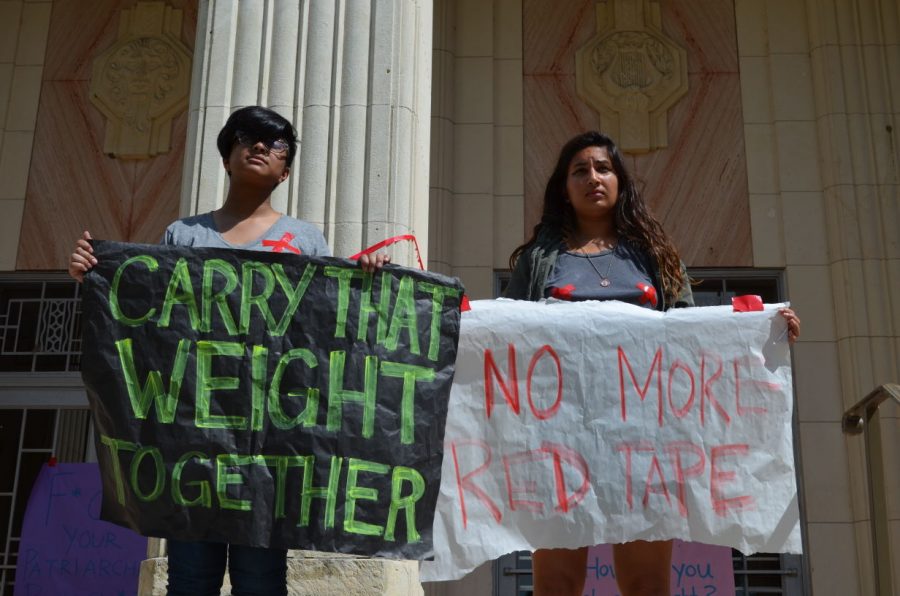Students unsatisfied with sexual misconduct hearings, punishments
Students stand silently in protest of the current sexual assault problem on college campuses in the “Carry that Weight” event on April 13.
April 15, 2015
Tulane students are setting up mattresses around campus and painting supportive messages for victims on Lavin-Bernick Center windows to promote Sexual Assault Awareness Month, and many of them are calling for the reform of the student conduct process to ensure perpetrators of sexual assault are unable to walk free.
When students are sexually assaulted, they have the option to pursue punishment for their attacker through the Tulane Office of Student Conduct, the criminal justice system or both.
One source, a student who contributes to The Hullabaloo and requested to remain anonymous because of the sensitive nature of the incident, reported she had been sexually assaulted in the fall semester and went through the student conduct process to pursue punishment for the attacker.
The anonymous source said that Tulane’s conduct process was unnecessarily hard on her as the victim.
“You would think living in a world today and with all the resources Tulane has, that if something like this happened, I wouldn’t be made to feel like the one who has committed a crime,” the source said.
A 2007 U.S. Department of Justice study found that one in five women experience sexual assault on college campuses along with one in 16 men.
The Office of Student Resources and Support Services receives reports of a sexual assault if the victim reports the incident to a “mostly confidential” resource, including resident advisors and Tulane University Police Department. If the victim reports to a “strictly confidential” resource such as Counseling and Psychological Services, the Student Health Center or Sexual Aggression Peer Hotline and Education, that information remains completely confidential within those organizations.
RAs are required to report to Housing and Residence Life if they believe or learn that one of their residents has been sexually assaulted, though Associate Director for Residential Education Kathryn McDonald said RAs are not involved in any student conduct processes.
“We have trained RAs to always report,” McDonald said. “It’s not their job to figure out what happened. Their job is to support that student.”
Coordinator of Violence Prevention and Support Services Julia Broussard meets with victims the next business day after they are assaulted to discuss any immediate assistance they may need, such as accessing mental or physical health resources or emailing professors if the student is missing class. Broussard also informs the victim of the courses of action that can be taken following an assault.
If students wish to go through Student Conduct, SRSS works to make sure the victims feel safe if they live on campus, especially if their attacker lives in the same residence hall. McDonald said in the majority of cases, HRL will move the victim to another residence hall but that there have been some cases where the accused student’s housing privileges have been terminated.
“Sometimes, there have been cases where we deem it enough of a threat that [the accused student] can’t live on campus anymore,” McDonald said. “We tell them, ‘You need to find a temporary space before this case is heard.’ Then it’s in their hands to find that place.”
Broussard said the university can also prevent the accused student from entering the residence hall of the victim. The university can issue a no-contact order, which prevents any communication between the victim and accused student.
Junior Courtney Liss, who organized the sexual assault awareness LBC window-painting campaign, attended a screening of “The Hunting Ground” Wednesday as part of Sexual Assault Awareness Month. The movie discusses the prevalence of sexual violence on college campuses. Liss said Assistant Vice President for Student Affairs Erica Woodley attended the screening and said she believed no student found responsible of sexual assault had been expelled last year.
Liss said that colleges do not treat sexual assault as a pressing issue.
“In criminal court, murder and rape are treated as felonies, but on college campuses, they’re treated like just an annoyance,” Liss said. “I don’t think expulsion should be the only answer, but it should definitely be an option that’s talked about. Students shouldn’t have to go to school with their rapists and sit across from them in class.”
A neutral university investigator begins the investigation by collecting evidence and conducting interviews with the victim, accused student and any witnesses. The investigator then compiles his or her findings in a report sent to both parties and the hearing board prior to the hearing. The hearing board consists of a different student, faculty member and staff member each time, all of whom have gone through both regular and sexual assault-related conduct trainings.
During the hearing, the investigator reports the findings to the board. The board can ask questions to the victim, the accused student and witnesses. Additionally, the victim and the accused student can ask the other party questions in writing. Both parties also have the support of an advisor at the hearing.
Broussard said there are several options if the victim does not want to fully participate in the hearing. Instead of having to face their attacker, victims can choose to speak on the phone or via Skype or have a screen set up between the two students. The victim can also choose to only serve as a witness, foregoing the ability to ask questions to the accused student. If the victim serves as a witness, he or she does not have to remain in the same room as the accused student during the entirety of the hearing.
Broussard said if victims decide not to fully participate in the hearing process, it makes them feel more comfortable but can also make finding the accused student responsible more difficult.
“It feels more like the school is in the driver’s seat, which for some people feels better because they feel a lot of ambivalence,” Broussard said. “It makes it a lot harder for us to find a student responsible, though, because there’s usually some information that ends up lacking and questions that are unresolved for the hearing board.”
During the student conduct hearing, the student reported she was forced to face her attacker and was not properly informed of any alternatives.
“I feel like there shouldn’t even be an alternative,” the source said. “I should be able to go to the hearing with him not there … Why am I being the one who has to take extra steps to make it more convenient for him?”
The anonymous source said the hearing board asked her questions she considered inappropriate, which she felt served as victim-blaming.
“’Are you sure?'” the source said. “Did you say no? Could you describe that night? What were you wearing?’ These questions should not be asked of me.”
After collecting all statements, the board will determine if it found the accused student responsible. Broussard said if the student is found responsible, the board will decide any sanctions against the student, which at most can include suspension from the university and termination of housing privileges.
Broussard said witnesses can attest to the character of the attacker and the impact the incident had on the victim.
“The accused student has the ability to have character witnesses who can speak to their character and presumably say ‘This is a good person who just made a mistake’ or something to that effect,” Broussard said.
Broussard said the prosecution of students who break Tulane’s rules is a top priority of the university.
“At the point that the university becomes aware that one of our students may have violated our policies, the university has an obligation to follow up on that report because that’s concerning if we receive reports of one of our students engaging in sexual assault,” Broussard said.
The anonymous source said she is unsure of the extent of the punishment of her attacker but that she knows he is still on campus.
“I was scared, and it’s something that will never leave me for the rest of my life,” the source said. “Yet how has his life been affected? A slap on the wrist from the university and a file in his folder. He is still here. There is no justice in a process that leaves me terrified walking alone at night, still in fear of my attacker.”










Leave a Comment